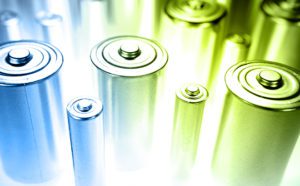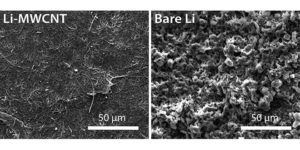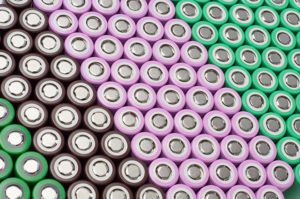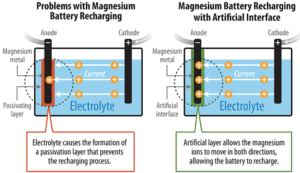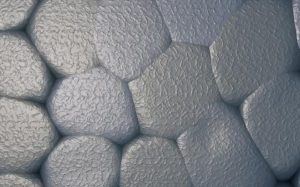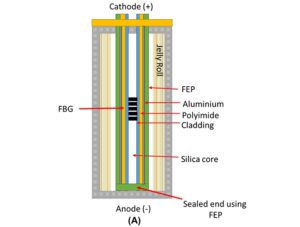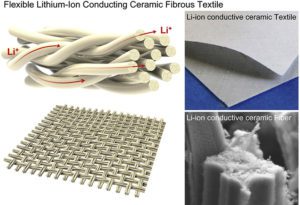In a paper published in Proceedings of the National Academy of Sciences, researchers from Rensselaer Polytechnic Institute demonstrated how they can overcome the dendrite problem to create a metal battery that performs nearly as well as a lithium-ion battery but relies on potassium, which the researchers say is a more abundant and less expensive element…. Read more »
Search Results Found For: "dendrites"
IBM unveils heavy metal-free battery that performs better than Li-ion
IBM Research has unveiled new battery materials extracted from seawater that it says could help eliminate the need for dangerous heavy metals in battery production. Use of the three new proprietary materials create a battery chemistry that does not use heavy metals or other substances that suffer from concerns about sourcing. Beyond the environmental and… Read more »
Researchers create air-stable, waterproof wax coating for lithium metal anodes
Lithium metal is a promising new material for battery electrodes, thanks to its high specific capacity and low voltage, but safety issues caused by dendrite growth and instability in air caused by its high chemical activity limit its large-scale use as an electrode material. However, a simple and efficient solution could be on the way… Read more »
Carnegie Mellon researchers develop semi-liquid lithium metal anode to pair with solid ceramic electrolytes
Researchers from Carnegie Mellon University have developed a semi-liquid lithium metal-based anode that could lead to higher capacity and better safety than typical lithium metal-based batteries that use lithium foil as anodes. The research team published their findings in the June 2019 issue of Joule. “Incorporating a mewtallic lithium anode into lithium-ion batteries has the… Read more »
Carbon nanotubes help make lithium metal batteries more durable
Carbon nanotubes could make high-powered, fast-charging lithium metal batteries an alternative to lithium-ion batteries, according to new research from Rice University. In a paper published this month in the journal Advanced Materials, the researchers show how a carbon nanotube film can be used to keep batteries safe from dendrites, spear-like protrusions that naturally form on… Read more »
University of Michigan researchers develop non-combustible, non-degrading ceramic electrolyte
Scientists at the University of Michigan have developed a solid-state electrolyte which they claim is non-combustible (which is good, because it’s heated to over 1,800° F during manufacturing!) and not vulnerable to dendrite formation due to a stabilizing ceramic layer. The electrolyte has special properties that allow for increased capacities and faster charging rates as well. Current… Read more »
NREL scientists discover new approach for magnesium-metal batteries
Scientists at the National Renewable Energy Laboratory (NREL) have pioneered a method that enables reversible chemistry of magnesium metal in noncorrosive carbonate-based electrolytes. The technology has several potential advantages over lithium-ion batteries, including higher energy density, improved stability and lower cost. Magnesium batteries can theoretically store almost twice as much energy per volume as lithium-ion… Read more »
Self-healing anode eliminates dendrite buildup
Researchers at Rensselaer Polytechnic Institute (RPI) have demonstrated a “self-healing” lithium-metal anode that can eliminate dendrite buildup. Researchers are looking for ways to replace graphite anodes with lithium metal in order to boost energy density. However (as regular Charged readers know), lithium metal anodes are plagued by the buildup of dendrites, branchlike protrusions that can grow… Read more »
New Li-ion battery sensor tech promises 5x faster charging
According to researchers at the University of Warwick (UK), a new testing technique they have developed shows that commercially available lithium-ion batteries can safely be charged up to five times faster than currently recommended. In a paper entitled “Understanding the limits of rapid charging using instrumented commercial 18650 high-energy Li-ion cells,” published in the journal Electrochimica… Read more »
Garnet ceramic electrolyte helps block dendrite formation
Researchers at the University of Maryland have developed a new template that they hope will enable a safer alternative to liquid electrolytes, which have several drawbacks, including flammability, leakage and dendrite formation in the electrodes. In “Lithium-ion conductive ceramic textile: A new architecture for flexible solid-state lithium metal batteries,” published in Materials Today, UMD researchers… Read more »




